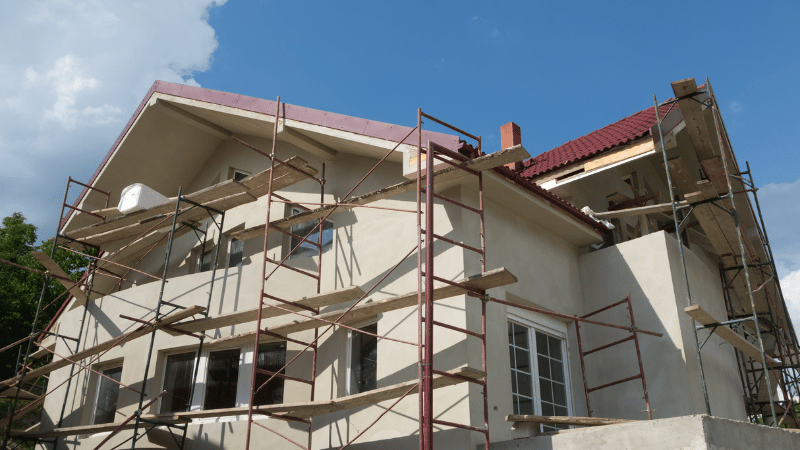Categories
Russia Ukraine Conflict: The Effects On The Mortgage Market

Russia’s war on Ukraine has already caused economic ripples across the globe, with stock markets experiencing volatility and the price of crude oil surging to over $100 a barrel.
Written by: Sam Hodgson
While it’s very difficult to predict the twists and turns down the road as the conflict develops, the first few economic signals are apparent already, and we can look at the potential effects of these on the future of the housing and mortgage market.
Find the Perfect Mortgage
Skip to:
How Could the Ukraine Conflict Affect Inflation and Interest Rates?
The Effects of Higher Interest Rates on Mortgages and House Prices
How Could the Ukraine Conflict Affect Inflation and Interest Rates?
Both Russia and Ukraine are large exporters of crude oil and natural gas, and both these commodities have already increased in value since the conflict began.
Higher oil and gas prices mean rising inflation - a rate that skyrocketed in the UK in 2022. Inflation reached its highest peak in 40 years, sitting at just over 11% after a period of economic turbulence brought on by the conflict in Ukraine, the mini-budget, and COVID-19.
To combat rising inflation, the Bank of England increased the base rate, which has affected mortgage rates, making mortgages more expensive.
At the beginning of December 2021, interest rates were sitting at the record low of 0.1%. Since then, they have increased to 5.25%, the highest they have been in 16 years.
However, it seems that for now, the UK mortgage market has adapted to the economic fallout from these circumstances. It is possible that we could actually see interest rates drop in the coming months. The next Bank of England announcement is on the 1st August, and many economists are confident that the base rate will be reduced.
While you're here: How to Get a Green Mortgage - Could you Save Thousands on your Mortgage and Energy Bills?
The Effects of Higher Interest Rates on Mortgages and House Prices
The base interest rate set by the Bank of England directly affects two main aspects of personal finance: mortgage interest rates, and interest earned on cash savings.
Your bank will likely pay you more interest on your cash savings if the base rate goes up, but they’ll also charge you more for borrowing money.
You could pay a higher interest rate on your mortgage if you are:
- Taking out a new mortgage soon - either with a new property purchase or a remortgage
- Currently on a tracker mortgage - if the base rate goes up, so will your tracker mortgage’s interest rate
- Currently paying your bank’s Standard Variable Rate (SVR) - like a tracker mortgage, this will likely increase in line with the base rate
Or, to get straight to the point, book a consultation with a mortgage adviser who will go through the best options for you.
Related: Are Mortgage Rates Going Up in Response to Interest Rate Hikes? & Should You Get a Tracker or Fixed Rate Mortgage in 2025?
What Does Our Expert Say?

George Abouzolof
Senior Finance Broker CeMAP
It’s possible that product rates will remain static during the New Year, but with the usual Christmas purchasing trends, it’s likely that inflation will climb higher.
The Autumn Budget announced a rollout of new government spending, which tends to drive up inflation and impacts mortgage rates.
It’s possible that the Bank of England base rate will be held after the next inflation announcement, and it’s unlikely it’ll be reduced further unless something in the market changes significantly.
I’m seeing less buy to let purchases since the Budget, which likely has a correlation with the new property tax hikes. Some landlords are leaving the market due to increased costs eating away at rental yields, but this could free up more housing stock for residential buyers.
Compare rates and get an instant quote using our online mortgage calculator
What Are The Current Mortgage Rates?
Here's a table of current mortgage rates that we've recently secured for clients:
2 Year Tracker
Up To £5m
4.94% APR
2 Year Tracker
Subsequent rate 6.99%
LTV - 60%
APRC 8.4%*
Product Fee £999
Free standard valuation
Early redemption charges
As of 10th January 2024
5 Year Fixed
Up To £1.5m
3.89% APR
5 Year Fixed (Remortgage)
Subsequent rate 6.25%
LTV - 60%
APRC 6.1%*
Product Fee £999
Early redemption charges
As of 10th January 2024
2 Year Fixed
Up To £1.5m
4.44% APR
2 Year Fixed (Remortgage)
Subsequent rate 6.25%
LTV - 60%
APRC 6.1%*
Product Fee £999
Early redemption charges
As of 10th January 2024
Contact Us
Thank You for your interest - please complete the form below and a member of our team will be in contact.
What About House Prices?
It’s a difficult and complex answer as to what will happen to the housing market going forward, but in response to a higher cost of living, house prices have begun to slow down. The market is showing signs of recovery, despite a reprieve for consumers amid the cost-of-living crisis, but it may still experience difficulty leaving the housing slump in the long term.
In recent years, the demand for houses has outweighed the supply. And buy to let properties becoming a more mainstream and reliable investment vehicle over the last few decades has been just one factor in this.
But higher interest rates and more expensive mortgage products means that fewer people will be taking out mortgages.
Lack of affordability across the country has caused the average age of first-time buyers to rise, as many decide to rent for longer or move back with their parents to save. While a drop in interest rate is on the horizon, the low interest rates we saw in 2021, are 'a thing of the past'.
See the latest market news below.
Where Are the Most Affordable Places in the UK to Buy a Home?
House prices are rising, but not as rapidly as they were before 2022.
In 2024, we did see a modest rise in house prices, but since the budget, this has come down slightly. The Bank of England base rate has dropped, but mortgage deals don’t seem to be moving in response to the Autumn Budget, which has since been widely considered inflationary.
As the housing market begins to recover from the past four years of economic turbulence, there seems to be a case of push and pull between house prices and interest rates restricting affordability.
Limited affordability has caused a visible divide between the UK’s most and least affordable housing. And unfortunately, in more expensive areas, first time buyers aren’t getting to enjoy much of a drop in house prices because the difference is made up by high interest rates and less favourable mortgage deals.
Mortgage rates have come down slightly from their 15-year high, and while the housing market does seem to be on the mend, it’s still not the easiest time to buy property for first-time buyers and investors alike.
For buy to let investors, regulations have gotten stricter since 2022, and high mortgage rates have thinned profit margins, making owning a standard buy to let a trickier affair than a decade ago.
While house prices have dropped slightly due to lack of affordability across London and the rest of the South, this isn't the case in other regions.
But this isn't the case everywhere in the UK. The North of England has seen entirely different purchasing behaviour to the South since the early 2000s. In select areas, particularly Yorkshire, North Lincolnshire and Durham, you can still easily buy a property for under £100,000.
Due to affordable housing and cheaper living costs in these areas, most of Northern England and Scotland have been resistant to the housing slump that the rest of the UK has experienced in response to high mortgage rates. The property market in these regions has remained robust and has seen growth throughout 2024.
There's certainly hope, both for property investors and those looking to get on the housing ladder. If you're looking to invest in a buy to let in 2024, it may be worth looking in affordable areas with a consistent rental demand, such as university towns or areas close to large employers. Property hotspots like these are still reaping generous rental yields while the rest of the country is seeing slow growth.
For first-time buyers, house prices coming down significantly could make it much easier for them to get on the housing ladder, but in many cases, house prices going up is beneficial for those using equity in their homes to make another purchase.
Read blog: The Fastest Growing Property Price Locations in the UK.
Get Access to Market-Leading Rates
Despite current optimism about declining mortgage rates, deciding on the best option can be daunting and confusing.
We can help you compare mortgage products and their cost to find the best deal based on your specific situation from a wide range of lenders nationwide.
Expert mortgage advisors have their finger on the pulse of the latest mortgage market news. Whether you're a first-time buyer or looking to refinance or invest in a BTL, we can help you understand your mortgage options so you feel confident you're making the right choice.
To see what we can do for you call us on 0117 959 5094 or book a free consultation below.









